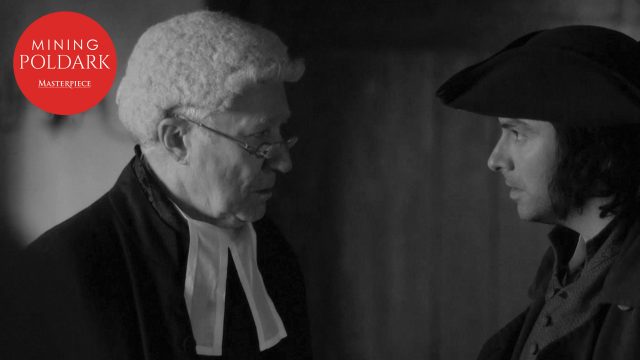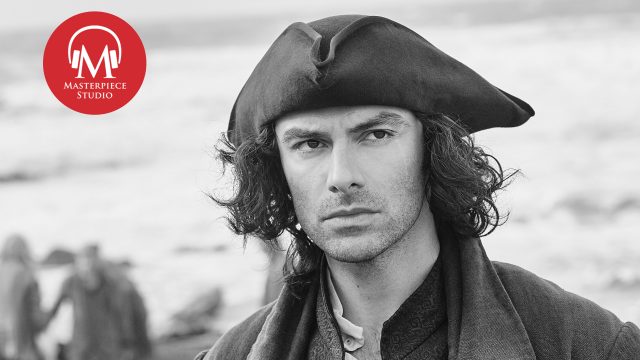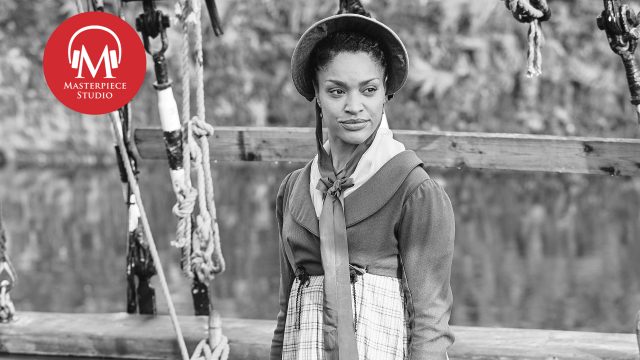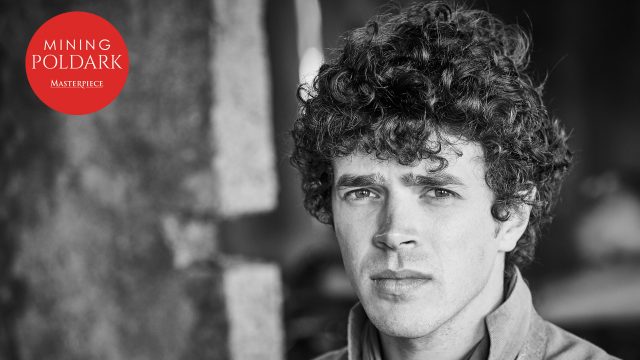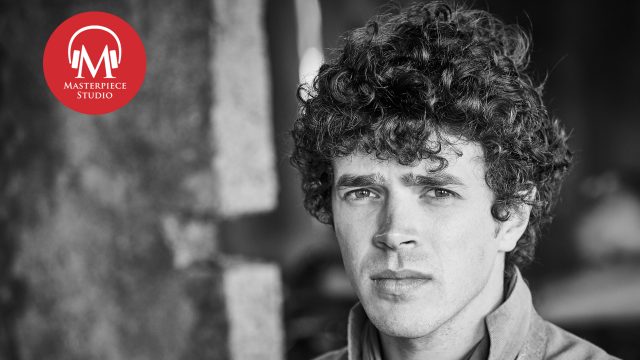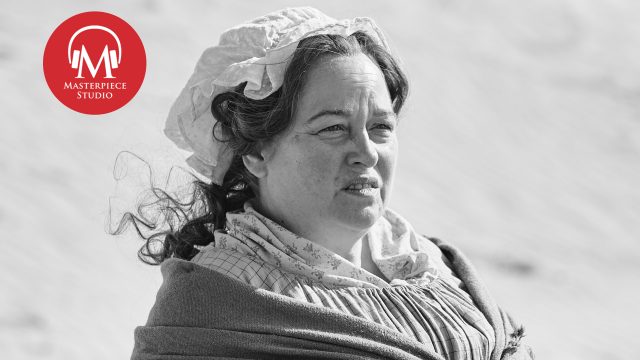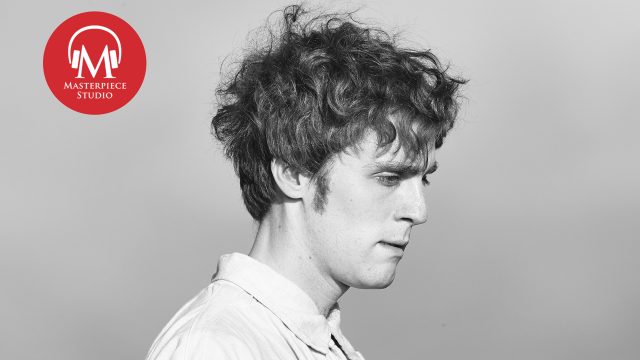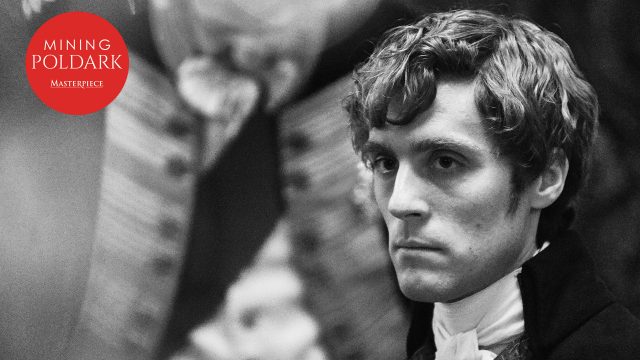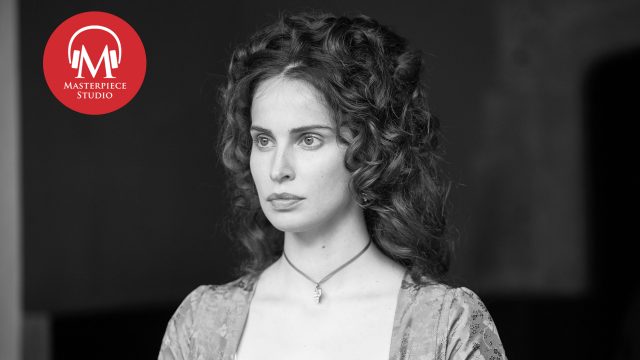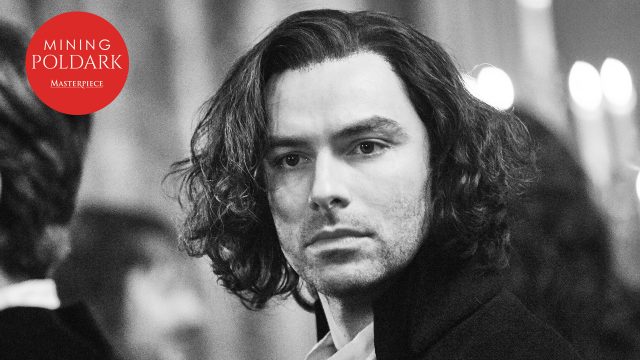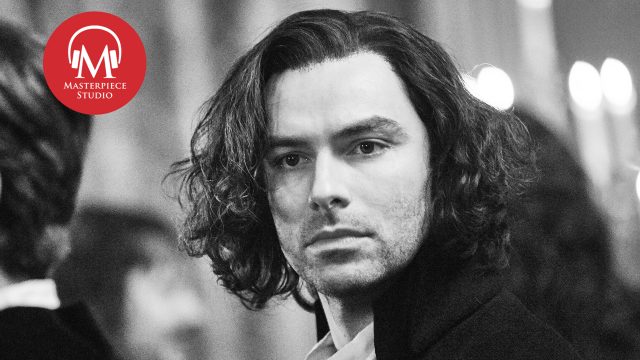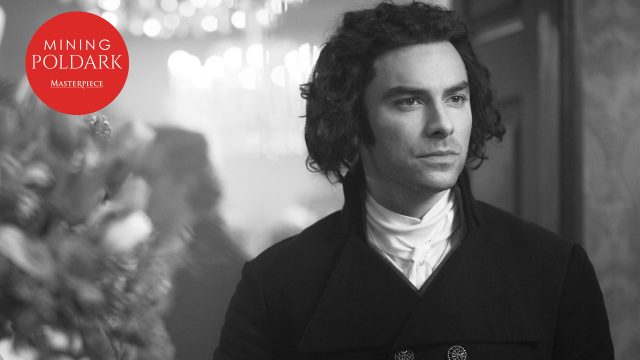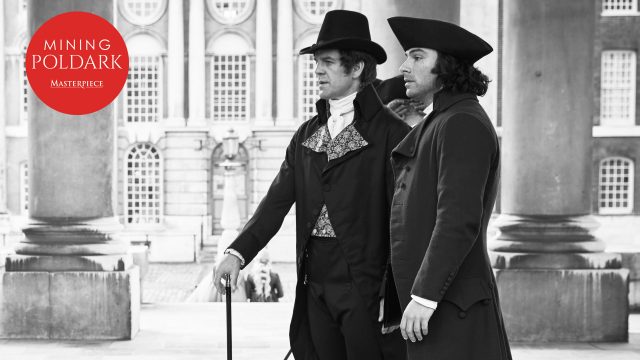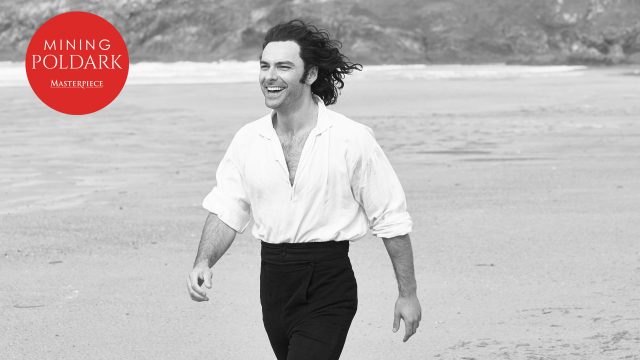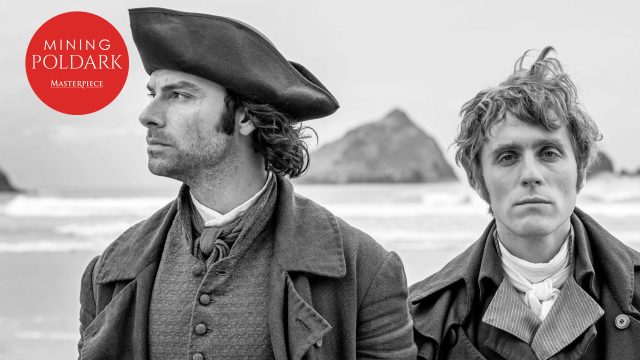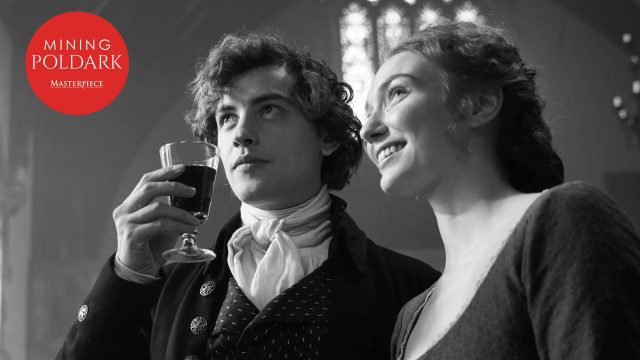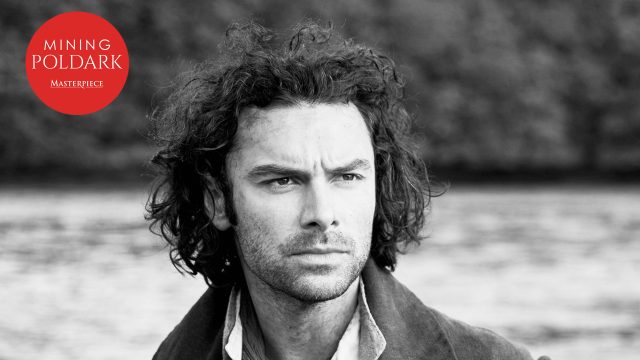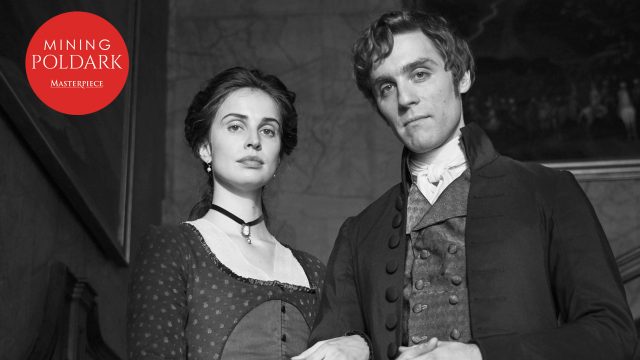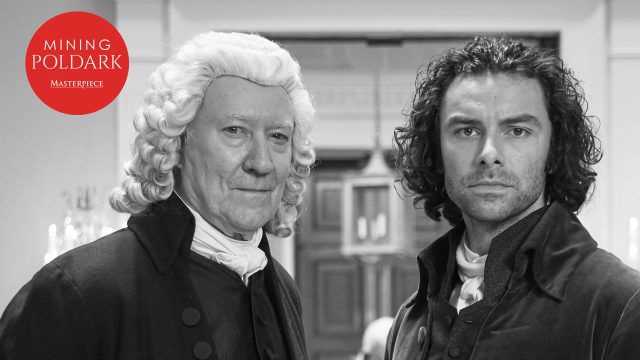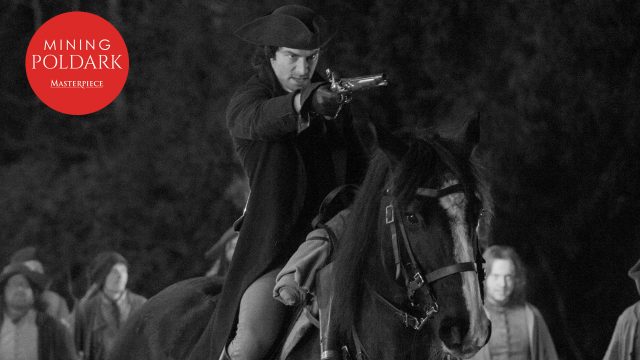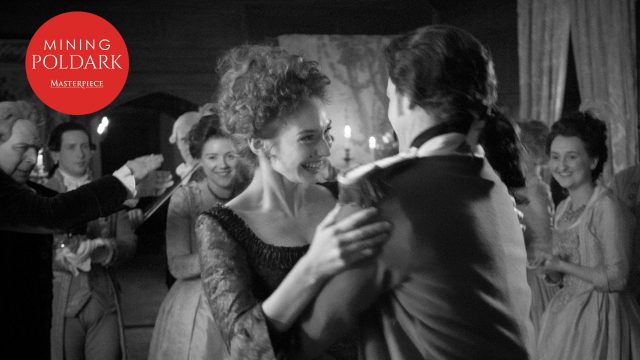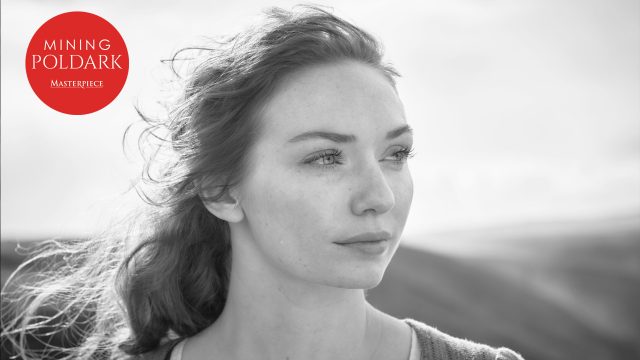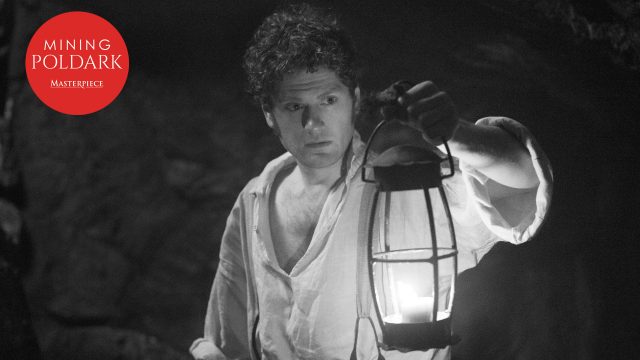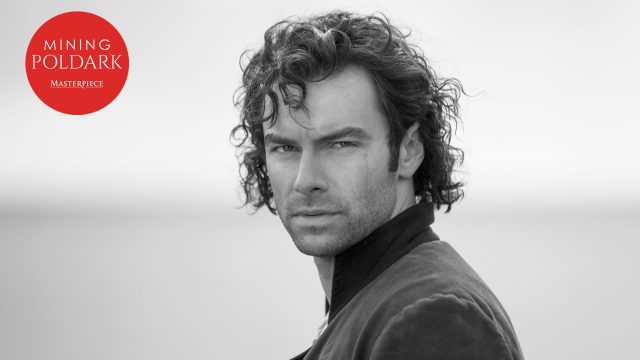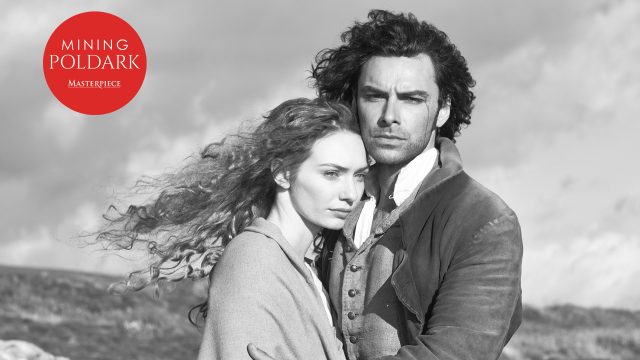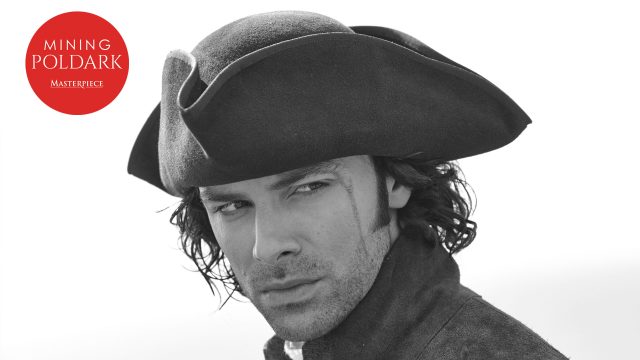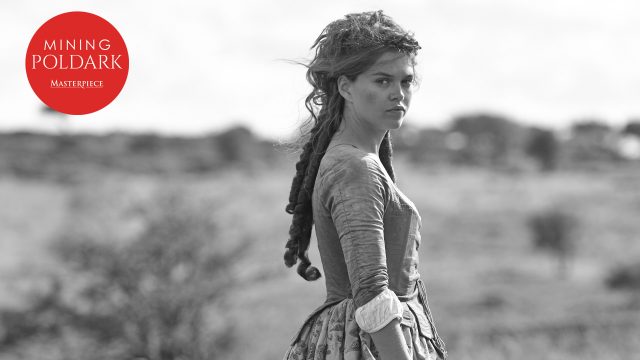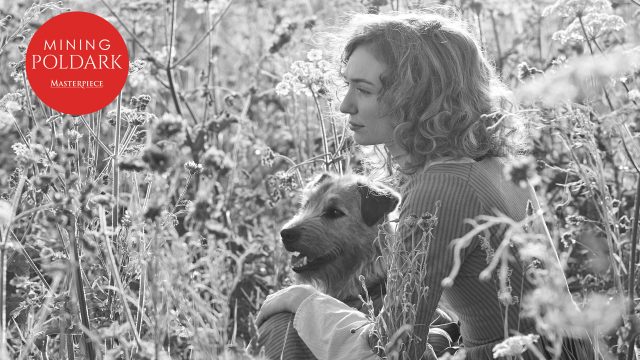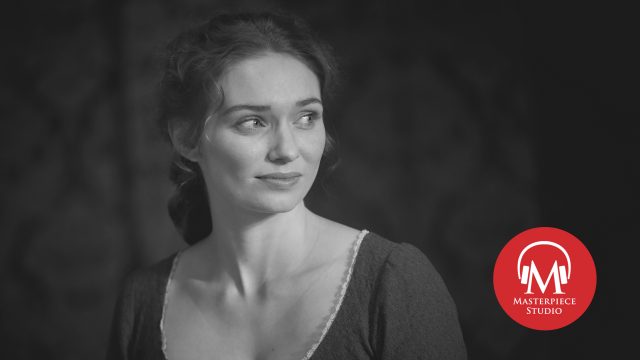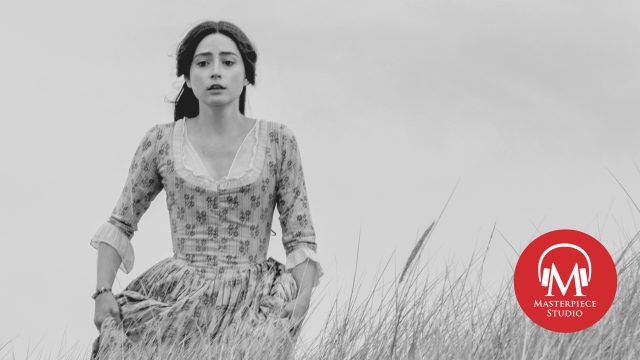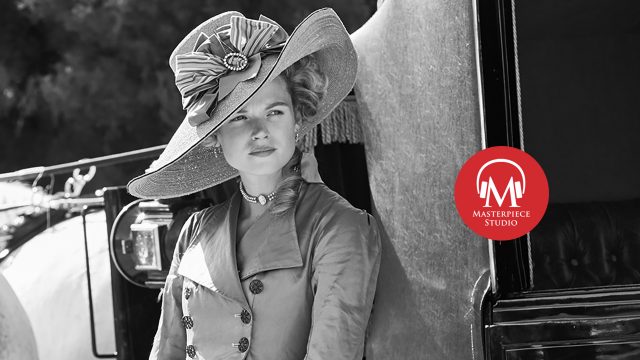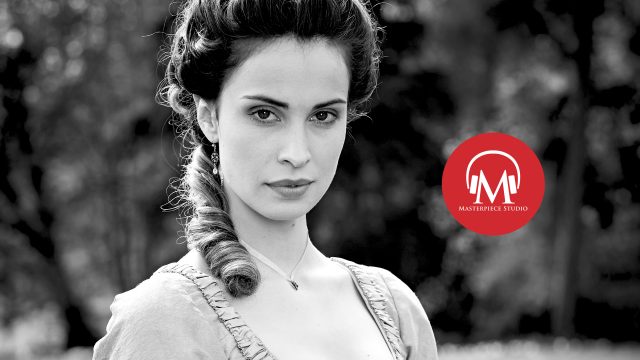Barrett Brountas: It’s a swashbuckling, classic tale — boy meets girl, pride meets prejudice — all in a beautiful wrapper: the dramatic Cornish cliffs and dazzling sea. It can only mean one thing: Poldark.
CLIP
Ross: Is there really nothing between us now?
Elizabeth: I thought you were dead! How can you come to me now and ask me things you know I can’t answer?
Ross: Why can’t you answer? Why can’t you answer?
Elizabeth: There’s nothing for you here, Ross. I love Francis. You must forget me and make your life elsewhere.
Ross: You may rely upon it.
Barrett: Aidan Turner plays Captain Ross Poldark in Debbie Horsfield’s modern adaptation of the series. But sadly, as we all know, the upcoming fifth season will be the last. As we get ready for the final season, we here at MASTERPIECE are starting this new podcast we’re calling Mining Poldark so you can relive the romance, the adventure and the exploits of our flawed hero all over again. We’ll take you episode-by-episode through all the angst and passion that make the show so utterly fantastic. We’ll talk to series actors, Cornish historians and more besides, all with an eye to giving you a fuller Poldark experience.
I’m Barrett Brountas, and I’ll be your host.
Now, many of you may not be aware that Poldark is based on the novels by Winston Graham. And that there was a PREVIOUS television adaptation in 1975. The first adaptation premiered with MASTERPIECE’s then-host, Alastair Cook, hinting at what was to come.
CLIP
Alistair Cook: Tonight we begin a new series, called Poldark, which is based on four novels by Winston Graham and runs to 16 episodes so I can only say that now is the time for the party to settle in for a spate of dueling, and loving and wenching and poaching and marrying, not to mention banking and copper mining.
Barrett: But what made this first adaptation a sensation in Britain and in the US was Robin Ellis, playing the role of Poldark. So I’m thrilled that THE Robin Ellis has agreed to be my co-host. Welcome Robin Ellis!
Robin Ellis: Thanks Barrett, I’m thrilled to be here.
Barrett: To start this podcast, and every podcast, Robin and I are going to give a recap of the episode. It’s our cheat sheet about what happened, in case you haven’t had the chance to watch the episode for a few years. Here we go. Captain Ross Poldark returns to Cornwall after the American war to find that his father’s dead, his estate and mines are ruined and his beloved Elizabeth is marrying his cousin. Everyone’s like, ‘Pack up your tricorn hat and your injured pride, there’s nothing for you here.’ But is there? He rescues Demelza, a nearly feral young woman from a gang of dog fighters and makes her his kitchen maid. When her abusive father shows up to reclaim her, Ross beats him down and recovers his will to go on when his squad of mining bros turns out to support him. Elizabeth or no, he’ll stay after all and fight the good fight in Cornwall.
Robin: In a romantic historical drama you’ve got everything. It starts with a skirmish in the woods with muskets, a romantic flashback, an unexpected homecoming, an engagement party, a near drowning, a controversial wedding, and a disturbance in downtown Truro that has a surprising outcome. So, what more could you want?
Barrett Now we can dive directly into the premiere episode of Poldark. As you noted it starts off with the high drama of battle in America, and what we learn from this right away is who Ross Poldark is. He’s a renegade. He’s a believer in liberty.
Robin: Yes he is. That really defines this young man. He’s only I think about 22 because the series begins in 1781 and this extraordinary happening, this skirmish happens and it looks as though our hero is lying absolutely prone on the ground, dead. But two years later, we hear the sound of a coach, and he’s not dead at all.
Barrett: He has a very rough homecoming, and it goes from bad to worse because, in the carriage, he hears gossip.
Robin: In the carriage are two local people, a mother and a daughter who are gossiping away. And the mother has recognized who this is, that it’s Ross Poldark.
CLIP
Daughter: Was he not reported dead?
Priest: Better if he had been. He’s brought little credit to his family.
Mother: His father was no different. A scoundrel.
Priest: And a libertine.
Robin: And then he opens his eyes and the wonderful shock on the mother’s face when she realizes that he’s heard everything that’s been going on. And I must say Aidan does this very well. It’s a wonderfully brooding opening for this extraordinary romantic character. And it’s revealed to him that it’s a disaster that he’s coming back to. And as well as that, Barrett, do you remember, there’s a kind of atmosphere in the coach when he announces that he’s not going home to Nampara straight away. He’s going to Trenwith which is where his cousin Francis and his Uncle Charles live and the people in the coach obviously they’re looking pretty uncomfortable. And we will soon discover why.
Barrett: Turns out that the two women in the coach were not the only ones who thought Ross Poldark was dead. He enters Trenwith into the dining room where it’s packed with just about everyone in his life that’s important to him and says, ‘I hope I’m not intruding!’ Well, ouch. Because it turns out he is. Everyone’s really happy to discover that he’s alive. However he has more bad news on top of learning about his father’s death. It turns out that his beloved Elizabeth is to marry his cousin Francis. And this is a very very awkward moment for everyone except for Elizabeth’s mother who’s thrilled to be the bearer of bad news. Elizabeth is she. She’s sort of very very joyful to see him alive but also heartbroken and crushed and worried about what she’s going to do. She’s engaged to Francis and Ross is devastated.
Robin: That’s right. In fact, Elizabeth’s has a wonderful breathless moment where she…I mean, it literally takes her breath away when she sees Ross who she obviously wasn’t expecting to see, as well was nobody around the table. It took them all by huge surprise. And in normal circumstances of course it would have been an unqualified welcome return. But everybody except Ross knows that things have changed around here and he’s probably the most unwelcome, well not the most unwelcome. But you know what I mean, that, boy, this is going to be a very awkward moment.
Barrett: It becomes more and more awkward. He doesn’t know how to handle this so and this is the moment from the episode that I want to talk about as my favorite moment from the episode. It is where all the stakes are revealed for pretty much what’s going to go forward throughout the whole series. He wants to be noble. He wants to do the right thing. His heart is broken, but he raises his glass and says:
CLIP
Ross: But first, a toast. To Elizabeth and Francis. May they find happiness together.
Dinner Party: To Elizabeth and Francis.
Robin: One thing about that that opening party scene is it’s so brilliant because like in a number of Chekhov plays, for instance, the the opening scene is a dinner or a lunch party, and at dinner or lunch parties, all the guests arrive. And so this is a wonderful device to introduce everybody to the cast, in fact, to the people in the story. And there they all are sitting round the table and we get to know Francis and Elizabeth and Verity and Uncle Charles and Aunt Agatha, they’re there and Ross arrives and it’s a wonderful way of being of being acquainted with these extraordinary people that are going to be with us for sometime in the future. I think that’s a lovely opening.
Barrett: Yes.
Robin: An extraordinary moment so early in the piece because it shows in a way it sets up the whole series doesn’t it?
Barrett: It absolutely does. And I think that’s something that somehow so economically it makes you feel…you don’t even really know him yet, and yet you’re gut punched as a viewer. I don’t know if it’s because we can all imagine what it would be like to be in that situation. But you know, he’s just learned his father’s died. Everything that he’s hoped for is dashed. And yet here was this one thing: she’s going to marry his cousin. So, you feel the pain as you’re watching it, and you now have everything, that all the stakes of the show are set up here in this one magnificent, painful, beautiful scene.
One scene that was really powerful for me that I feel like I just want to talk with you about because you’ve watched this closely, too, is when Elizabeth has a conversation with her mother in the garden.
CLIP
Elizabeth: I must speak with Ross, Mama.
Mrs. Chynoweth: To what purpose?
Elizabeth To explain, to ask him what shall we do?
Mrs. Chynoweth: There is nothing to do, you are engaged to Francis.
Elizabeth: But Ross and I…
Mrs. Chynoweth: Where is here now? Has he come to see you? What can he offer but poverty, uncertainty, a dubious reputation.
Elizabeth: I do not care about reputation.
Mrs. Chynoweth: But you should. Francis adores you. You will be mistress of Trenwith. Had Ross not returned…
Elizabeth: He has returned
Mrs. Chynoweth: If he still cared for you, would he not have been at the door by now?
Barrett: So Ross has not gone back to plead his case to Elizabeth and Elizabeth’s mother is is taking advantage of that is exploiting that and trying to make it seem as though he never cared anyway, he’s not as good as Francis. I like that. Because later I can’t help but think that if Ross had gone to see Elizabeth, maybe everything would have turned out differently. What did you make of that scene, Robin?
Robin: Well I agree with you. I think things would have turned out differently. When Ross turned up at the engagement party, Elizabeth seemed quite overcome, really. And one had the feeling that this was disturbing to her in the sense that she might renege on the engagement. Somehow, her instinct in her gut, she just feels, I’ve got to do this or I’ll regret it for the rest of my life. And her mother turns up at this critical moment and says this critical thing. And it clearly convinces her.
Barrett: She goes forward with the wedding. The Warleggans. We have it all at the wedding.
Let’s take a quick break to a hear a word from our sponsors…
Barrett And we might take a minute to talk about villains, because one of the things that we do have in this first episode is we have our antagonists established. We meet George Warleggan and his uncle, Cary. George has an enormous chip on his shoulder. He is the grandson of a blacksmith. His money, of which there is quite a bit, is earned instead of inherited. He’s not a gentleman. He resents Ross also because Ross was sort of that guy right. Growing up, there was that guy in everyone’s high school in America, as wel,l like somebody who’s just really popular and really successful at everything. Everyone loves this person. And even worse, they’re great people. So George’s is just as jealous as can be. And we get a sense that George, even though his roots are not in the aristocracy, George is a snob. He’s he thinks that money is the only thing that matters. And he and his uncle is egging him on in that respect, as well.
Robin: And there’s a lovely shot the first shots you see in this very nicely furnished room that the Warleggans are introduced in, the first shot, you see George handling money. He’s actually literally handling money. He’s weighing money. And that was a very good cut from another from previous scene, because his is the thing that George really at this moment in time cares most about, money. Well actually, of course, he cares about climbing the social ladder. But the means by which he will climb it is money. And it occupies his every hour, basically. And he’s egged on very much by Cary, who is his uncle, a great cynic who is a wonderful character.
Barrett: Oh, he is.
Robin: And a real cynic who would who would do anybody anybody down to better himself, basically, and has obviously to reach the point that they have where they, you know, they’re very,very rich and they live in a very big house. What they don’t have is status. And that’s what they want more than anything else.
CLIP
Cary: Perhaps I should have purchased her for you, nephew.
George: I broker my own business these days.
Cary: Well, she’ll be wasted here. These Poldarks have nothing beyond the name. Mine on its knees, and mortgaged to the hilt. Warleggans Bank may send in the bailiffs as and when it chooses.
George: This is elegant talk for a wedding, Uncle.
Cary: Talk of a profit is always elegant, George.
Barrett: So we have a comparison between George, who’s flush with money, and Ross, who is struggling. He doesn’t know what to sell to try to get his household up and running and someday see profit, and then his uncle who wants to get rid of him so that he’s not a threat to Francis in his marriage takes him out to look at their mines together. They have derelict mines and he says, ‘What you see here is the past. Your mines are worthless, derelict, your land is barren. There is nothing for you here,’ and this is this is the struggle of of Ross. He’s like the Cornish Hamlet. You know, what is his action going to be? Is he going to stay? Is he going to go? His uncle wants him to go.
Robin: Yeah. His uncle wants him off the scene completely because he sees he’s obviously not a terrifically fit person and he doesn’t perhaps believe that he’s got long to go and he wants Francis to establish or to continue the line as it were. And Elizabeth is beautiful and clearly is going to be the mother to the new Poldark in that that side of the line, and Ross comes into the picture and is is a big threat. I mean, he’s a big threat as Charles sees it. You know one can’t say that he’s necessarily wrong. Who knows? So Charles thinks Well I’ve got some money. You know, Ross actually left school quite early. He didn’t have very much formal education. So Charles thinks this is a way to tempt him.
CLIP
Charles There’s nothing for you here, boy. Your future lies elsewhere. A change of profession. The law, perhaps? Or even the church.
Ross D’you really not know me, uncle?
Charles A move to London… Oxford? I’ll fund it. Your education. Your expenses. I believe it’s what your father would have wanted.
Robin Charles’ motivations are completely revealed, and distrusted by Ross.
Barrett: Yes. However, Ross is still on the fence. And I think we should jump to market day because this sort of changes the equation.
Robin: Yeah, it’s a great scene and they’ve set it up beautifully with the market scene, bustling with people selling fish and ducks and even cows and bulls, and Ross trying to sell things from the house, trying to establish re-establish himself as a farmer, as a gentleman farmer, finding it very very difficult having found out from his lawyer, Pascoe, that he really doesn’t have any any resources at all and so he’s scrabbles around in drawers and gets out old watches and he’s seen selling these these little things in the market in order to buy fresh produce and livestock. And then he hears this extraordinary sound going on, and clearly it’s pretty unpleasant. And everybody’s there, all the cast is there, basically. You’ve got the Warleggans there, and Francis and Elizabeth are there, watching. And Ross leaps in and separates the two boys and confronts the boy who has stolen the dog, Garrick, and gives him a whooping.
CLIP
Demelza Hey! That is my dog. Get off him. Garrick! Get off him. Garrick! Let him go!
Ross: You take my advice. You run.
Youngster: Or else?
Robin And in a way that moment again is another moment of Ross expressing his frustration that he’s feeling, you know, he hasn’t been able much to express the the disappointment and anger and that he’s feeling about not fulfilling his hope with Elizabeth and in a way this moment is a moment of that journey, I think, and it’s quite violent.
Barrett: That’s a great observation. And it really tells us something about Ross, that’s he has a very dark side.
Robin: He does, he does have a dark side and it’s sometimes uncontrollable, and it comes out in various ways, but part of it is a stubbornness and an unpredictability, which can be very dangerous in fact. And actually I wanted to talk about the way Aidan plays the the whole of this episode. And he he just charts this journey so well he does it so well it just builds through and you feel this this anguish in the character that has various explosions on the way. And that was because there’s a scene in my version right at the beginning when I come into the party I immediately have this accusatory scene with with Elizabeth saying, ‘Well don’t you remember we were pledged, we had we had an understanding!’ And that meeting in fact in the new version takes place almost at the end of the episode. And so Aidan’s Ross builds to this scene and it means that his interpretation is is very close to the book I think so it’s much it’s much more loyal to the book but also it makes sense in terms of character, I think.
CLIP
Elizabeth: You’re making a mistake.
Ross: Am I?
Elizabeth: Your place is here. Your land, your mines.
Ross: Are you asking me to stay Elizabeth?
Elizabeth: I’m saying that everything that matters to you is in Cornwall
Ross: Where did you think I was going?
Elizabeth: To London. Your uncle said…
Ross: My uncle’s mistaken.
Elizabeth: Then what are you doing?
Ross: I lost sight of something. I came in search of it. Having found it, I’m going home.
Barrett: OK so we’re going to move into Ross Poldark —in this episode — Hero or hater. So what do you think Robin?
Robin: He does hate some things he hates injustice. He hates the cruelty meted out to the poor. He hates disloyalty. The scene when he comes back eventually to Nampara and discovers Jud and Prudie sleeping in his father’s bed, and there’s terrible mess and everything, he finds that disloyal to the memory of his father, makes him very angry. I think there’s an element of Ross also that hates convention and pretension, the behavior of the ruling class that he is supposed to be part of. So and that leads to various consequences, as it were. He’s always kicked against the conventions. But his instinct is positive, and that’s I suppose a hero’s instinct in a sense. He’d never describe himself perhaps as a hero, of course. But I think I would I would come down for hero, rather than hater.
Barrett: OK. Me too. He makes it very clear that they were on the wrong side in the war with America, so he loves liberty, and he hates, as you would say, he hates tyranny.
Robin: Very good. Very good point.
Barrett He rescues Demelza from that gang. He beats down Demelza’s abusive dad. And I think that the final reason that we have to know that he’s a hero in this episode is that we’re even treated to a God shot of him at the end. It’s sort of from from Demelza’s perspective she looks up at him and there he is atop his horse smoldering, and you know, chiseled like a god. You’re seeing him from below. So he is every bit the hero, framed in that way, as we look up at him.
Robin: You’re right, it is a very stunning shot. It really pulls you up. Absolutely, I agree with you.
Barrett: So he wins, he wins the episode.
Robin: He wins the episode, he does, hands down. Well I think Winston, for instance, definitely saw him and wrote him as a hero. He’s sort of in the in the mold of literary heroes, he’s tall, dark and handsome. He’s hard to read. It’s hard to read what he’s thinking. He’s passionate, he’s opinionated. He’s unpredictable, and he’s stubborn, he’s unreasonable. You can’t reason with him. He’s rash, he goes down the mine that’s been out of commission, when Francis recognizes the risk. He doesn’t care about the risk, he’s a risk taker. And he has this scar on his face, the scar that picks him out as an outsider someone different someone who fought for the country and it’s on his face. But I think this also adds to his sort of hero status. He’s kind.
Barrett: Yeah.
Robin: He has a kind nature.
Barrett: The scar also is, sometimes, it will become in a way a reminder, a manifestation physically of something that’s inside of him that’s something that he carries an emotional scar.
Robin: Absolutely.
Barrett: Well what do we have, Robin, to look forward to this season?
Robin: We have smuggling we have a lot of smuggling, we have a lot of chasing of Ross being pursued by various officials. Ross is always escaping from the law, as indeed he did in the very first scene you saw where he was in the army as a result of trying to avoid getting hanged. So, you know he’s always on the run from something because he’s always pressed, really. We’ve got the ongoing romantic saga of the triangle, and the developing relationship between Ross and Demelza, which is going to feature so strongly for the rest of the series, a genuine romantic story. But of course it’s a triangle, a romantic triangle and he is in two minds as it were, or in two places. And that brings a lot of tension into the relationship with Demelza, which is entertaining and worth looking forward to. And there are lots of new characters, too, Barrett, and they all have wonderful value and they gradually get introduced through the weeks to come.
Barrett: We’re going to mine all of this in the weeks to come. Meanwhile I’ll just staring out at the impassive beautiful sea from my clifftop.
Robin: Having ridden your horse up to the point of the cliff, yes Well I’d like to see you in a tricorn hat.
Barrett: I will work on it. Thank you so much for talking with with us about episode one. It was a delight.
Robin: Well it was a delight for me too, I really enjoyed it. Goodbye, Barrett.
Barrett: Bye bye.
Before we go, I thought it might be a good idea to hear some of my colleague Jace Lacob’s interview with Poldark head writer Debbie Horsfield from our companion podcast, MASTERPIECE Studio. Here, Horsfield explains how Aidan Turner was always the only man she had in mind to play her updated version of Ross Poldark.
Debbie Horsfield: I normally don’t think about casting ‘till quite late on in the process. But I realised quite quickly that a kind of spectacular performer would be needed to to basically bring to life this really complex and charismatic character. So I started thinking to myself, ‘Who might this be?’ And I wrote one name down in my notebook and then said nothing to anybody else because I was thinking well probably no one will agree with me. And unbeknownst to me, Damien Timmer from Mammoth was having exactly the same thought, and it all came together one afternoon when we were on a recy in Cornwall. We are actually riding across Bodmin Moor in the fog. And I said, ‘Well who would we cast?’ And Damien sort of whispered this name. And I went, ‘Oh my God, that’s who I think it should be, too!’ And so we kind of hugged each other in the back of the car, and got so excited, because we kind of realized we were on to something. And I have to say, I think we were right.
Jace Lacob: I think you were right. What is it precisely about Aidan Turner that makes him such an ideal Ross?
Debbie: Well I had seen Aidan in Desperate Romantics and I had seen him in Being Human. And obviously those roles are very different to each other and their roles are very different to Ross. In both he was playing an outsider, I think. A kind of rebellious character, someone who didn’t conform, someone who wasn’t orthodox, someone who was very charismatic, strong, but also very, very vulnerable and very human. And I just had an instinct that, those were the qualities that would bring Winston Graham’s Ross to life. And I think the rest is history, really.
Barrett: That was Debbie Horsfield, in conversation with MASTERPIECE Studio host Jace Lacob. You can hear the full MASTERPIECE Studio interview — and listen to the rest of our MASTERPIECE Studio conversations, including with many of the core Poldark cast — on our website, PBS.org/MASTERPIECE, or on Apple Podcasts, Stitcher, RadioPublic or wherever else you listen to podcasts.
And you can join us in our rewatching adventure here on Mining Poldark by watching the entire series on PBS Passport — a new member benefit from your local PBS station. You can watch select MASTERPIECE titles like Poldark, Downton Abbey or Victoria as a part of the Passport experience. To learn more, visit pbs.org/getpassport.
You can also follow along with us on the the PBS Masterpiece Prime Video Channel, available as an add-on service to your Amazon Prime Membership.
Mining Poldark is hosted by me, Barrett Brountas, with co-host Robin Ellis. We’re produced by Nick Andersen, with help from Robyn Bissette. Meredith Wheeler is our field producer. Tina Tobey-Mack is our sound designer. Susanne Simpson is our executive producer. The executive producer of MASTERPIECE is Rebecca Eaton.
Sponsors for MASTERPIECE on PBS are Viking Cruises, Raymond James and The MASTERPIECE Trust. Poldark is a Mammoth Screen production for BBC, co-produced with MASTERPIECE.












